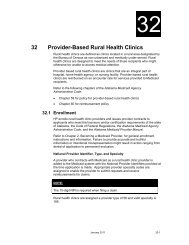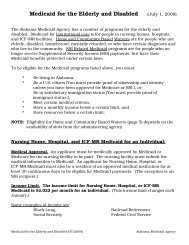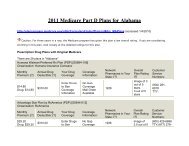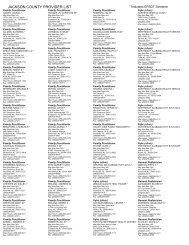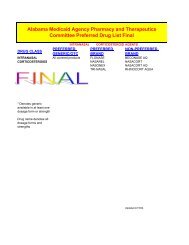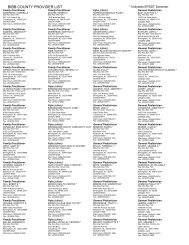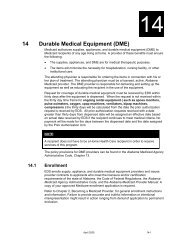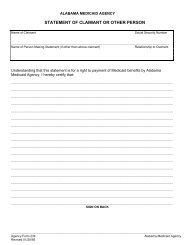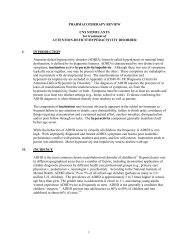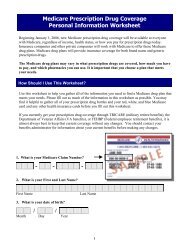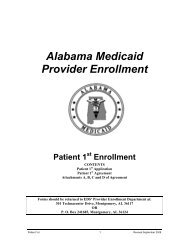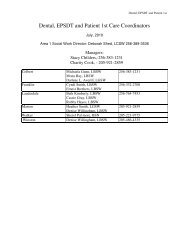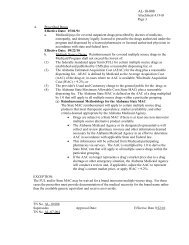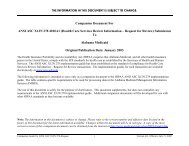Chapter 20 Independent Laboratory - Alabama Medicaid Agency
Chapter 20 Independent Laboratory - Alabama Medicaid Agency
Chapter 20 Independent Laboratory - Alabama Medicaid Agency
Create successful ePaper yourself
Turn your PDF publications into a flip-book with our unique Google optimized e-Paper software.
<strong>20</strong><br />
<strong>20</strong> <strong>Independent</strong> <strong>Laboratory</strong><br />
<strong>Laboratory</strong> services are professional and technical laboratory services in one<br />
of the following four categories. <strong>Independent</strong> lab services are:<br />
• Ordered, provided by, or under the direction of a provider within the scope<br />
of their practice as defined by state law<br />
• Ordered by a physician but provided by a referral laboratory<br />
• Provided in an office or similar facility other than a hospital outpatient<br />
department or clinic<br />
• Provided by a laboratory that meets the requirements for participation in<br />
Medicare<br />
The policy provisions for <strong>Independent</strong> <strong>Laboratory</strong> providers can be found in the<br />
<strong>Alabama</strong> <strong>Medicaid</strong> <strong>Agency</strong> Administrative Code, <strong>Chapter</strong> 9.<br />
<strong>20</strong>.1 Enrollment<br />
HP enrolls <strong>Independent</strong> <strong>Laboratory</strong> providers and issues provider contracts to<br />
applicants who meet the licensure and certification requirements of the state of<br />
<strong>Alabama</strong>, the Code of Federal Regulations, the <strong>Alabama</strong> <strong>Medicaid</strong> <strong>Agency</strong><br />
Administrative Code, and the <strong>Alabama</strong> <strong>Medicaid</strong> Provider Manual.<br />
Refer to <strong>Chapter</strong> 2, Becoming a <strong>Medicaid</strong> Provider, for general enrollment<br />
instructions and information. Failure to provide accurate and truthful<br />
information or intentional misrepresentation might result in action ranging from<br />
denial of application to permanent exclusion.<br />
National Provider Identifier, Type, and Specialty<br />
A provider who contracts with <strong>Alabama</strong> <strong>Medicaid</strong> as an independent laboratory<br />
provider is added to the <strong>Medicaid</strong> system with the National Provider Identifier<br />
provided at the time the application is made. Appropriate provider specialty<br />
codes are assigned to enable the provider to submit requests and receive<br />
reimbursements for laboratory-related claims.<br />
NOTE:<br />
The 10-digit NPI is required when filing a claim.<br />
<strong>Independent</strong> laboratory providers are assigned a provider type of 28<br />
(<strong>Independent</strong> <strong>Laboratory</strong>). The valid specialties for <strong>Independent</strong> Lab providers<br />
include the following:<br />
• <strong>Independent</strong> Lab (280)<br />
• Department of Public Health Lab (550)<br />
January <strong>20</strong>11 <strong>20</strong>-1
<strong>Independent</strong> <strong>Laboratory</strong><br />
Enrollment Policy for <strong>Independent</strong> Laboratories<br />
To participate in the <strong>Alabama</strong> <strong>Medicaid</strong> Program, <strong>Independent</strong> Laboratories<br />
must meet the following requirements:<br />
• Possess certification as a Medicare provider<br />
• Possess certification as a valid CLIA provider if a clinical lab<br />
• Exist independently of any hospital, clinic, or physician's office<br />
• Possess licensure in the state where located, when it is required by that<br />
state<br />
<strong>20</strong>.2 Benefits and Limitations<br />
This section describes program-specific benefits and limitations. Refer to<br />
<strong>Chapter</strong> 3, Verifying Recipient Eligibility, for general benefit information and<br />
limitations.<br />
<strong>20</strong>.2.1 Covered Services<br />
<strong>Medicaid</strong> reimburses <strong>Independent</strong> Labs for services described by procedures<br />
that fall between ranges 80049-89399 in the CPT manual. <strong>Medicaid</strong> also pays<br />
for procedures defined in the locally assigned Healthcare Common Procedural<br />
Coding System (HCPCS) to supplement the listing in the CPT manual.<br />
<strong>Medicaid</strong> only pays <strong>Independent</strong> Lab providers for covered services which they<br />
are certified to perform and which they actually perform.<br />
<strong>Independent</strong> Lab providers may only bill for routine venipuncture for collection<br />
of laboratory specimens when sending blood specimens to another site for<br />
analysis. Labs may not bill the collection fee if the lab work and specimen<br />
collection is performed at the same site. Labs may not bill the collection fee if<br />
they perform analysis in a lab owned, operated, or financially associated with<br />
the site in which the specimen was drawn.<br />
<strong>20</strong>.2.2 Non-Covered Services<br />
<strong>Medicaid</strong> does not pay packing and handling charges for referred laboratory<br />
services.<br />
The referred laboratory receives payment for referred tests only at the normal<br />
rate. <strong>Medicaid</strong> shall monitor this policy through post-payment review.<br />
<strong>20</strong>.2.3 Clinical <strong>Laboratory</strong> Improvement Amendments (CLIA)<br />
All laboratory testing sites providing services to <strong>Medicaid</strong> recipients, either<br />
directly by provider, or through contract, must be CLIA certified to provide the<br />
level of complexity testing required. The <strong>Independent</strong> Lab must adhere to all<br />
CLIA regulations. As regulations change, <strong>Independent</strong> Labs must modify<br />
practices to comply with the changes. Providers are responsible for providing<br />
<strong>Medicaid</strong> waiver or certification numbers as applicable.<br />
Laboratories which do not meet CLIA certification standards are not eligible to<br />
provide services to <strong>Medicaid</strong> recipients or to participate in <strong>Medicaid</strong>.<br />
<strong>20</strong>-2 January <strong>20</strong>11
<strong>Independent</strong> <strong>Laboratory</strong> <strong>20</strong><br />
NOTE:<br />
The Health Care Financing Administration (HCFA), now known as CMS,<br />
implemented the Clinical <strong>Laboratory</strong> Improvement Amendments of 1988<br />
(CLIA 88), effective for dates of service on or after September 1, 1992. The<br />
CLIA regulations were published in the February 28, 1992 Federal<br />
Register. More detailed information regarding CLIA can be found at<br />
http://www.cms.hhs.gov/clia/<br />
CLIA Certificates<br />
CLIA certificates may limit the holder to performing only certain tests. <strong>Medicaid</strong><br />
bills must accurately reflect those services authorized by the CLIA program<br />
and no other procedures. There are two types of certificates that limit holders<br />
to only certain test procedures:<br />
• Waiver certificates – Level 2 certification<br />
• Provider Performed Microscopy Procedure (PPMP) certificates – Level 4<br />
certification<br />
A complete listing of laboratory procedures limited to waived certificates (level<br />
2 certification) and PPMP certificates (level 4 certification) may be accessed<br />
via the web at www.cms.hhs.gov/clia/.<br />
<strong>20</strong>.3 Prior Authorization and Referral Requirements<br />
The Trofile Assay will be a covered service by <strong>Medicaid</strong> with prior authorization<br />
effective December 1, <strong>20</strong>08. The procedure code to be billed is 87999<br />
(unlisted microbiology procedure). In order to be reimbursed by <strong>Medicaid</strong> for<br />
the Trofile Assay, the ordering provider must submit a Prior Authorization<br />
electronically or by paper on form 342.<br />
Providers requesting a PA should include:<br />
• Any past history of antiretroviral medications prescribed to include date<br />
prescribed and the date the drug was discontinued;<br />
• The name and contact information of the HIV clinic that the provider is<br />
affiliated with if the requesting provider is not enrolled in <strong>Medicaid</strong> with<br />
specialty of infectious disease, and;<br />
• The result of the most current HIV-1 RNA.<br />
If you need further information, refer to chapter 4, Obtaining Prior<br />
Authorization, for general guidelines.<br />
<strong>20</strong>.4 Cost Sharing (Copayment)<br />
Copayment amount does not apply to services provided for laboratory<br />
services.<br />
January <strong>20</strong>11 <strong>20</strong>-3
<strong>Independent</strong> <strong>Laboratory</strong><br />
<strong>20</strong>.5 Completing the Claim Form<br />
To enhance the effectiveness and efficiency of <strong>Medicaid</strong> processing, providers<br />
should bill <strong>Medicaid</strong> claims electronically.<br />
<strong>Independent</strong> <strong>Laboratory</strong> providers who bill <strong>Medicaid</strong> claims electronically<br />
receive the following benefits:<br />
• Quicker claim processing turnaround<br />
• Immediate claim correction<br />
• Enhanced online adjustment functions<br />
• Improved access to eligibility information<br />
Refer to Appendix B, Electronic Media Claims Guidelines, for more information<br />
about electronic filing.<br />
NOTE:<br />
When filing a claim on paper, a CMS-1500 claim form is required.<br />
Medicare-related claims must be filed using the Medical<br />
<strong>Medicaid</strong>/Medicare-related Claim Form.<br />
This section describes program-specific claims information. Refer to <strong>Chapter</strong><br />
5, Filing Claims, for general claims filing information and instructions.<br />
<strong>20</strong>.5.1 Time Limit for Filing Claims<br />
<strong>Medicaid</strong> requires all claims for <strong>Independent</strong> <strong>Laboratory</strong> providers to be filed<br />
within one year of the date of service. Refer to Section 5.1.4, Filing Limits, for<br />
more information regarding timely filing limits and exceptions.<br />
<strong>20</strong>.5.2 Diagnosis Codes<br />
Claims for lab services must contain a valid diagnosis code. The International<br />
Classification of Diseases - 9th Revision - Clinical Modification (ICD-9-CM)<br />
manual lists required diagnosis codes. These manuals may be obtained by<br />
contacting the American Medical Association, P.O. Box 10950, Chicago, IL<br />
60610.<br />
NOTE:<br />
ICD-9 diagnosis codes must be listed to the highest number of digits possible<br />
(3, 4, or 5 digits). Do not use decimal points in the diagnosis code field.<br />
<strong>20</strong>-4 January <strong>20</strong>11
<strong>Independent</strong> <strong>Laboratory</strong> <strong>20</strong><br />
<strong>20</strong>.5.3 Procedure Codes and Modifiers<br />
<strong>Medicaid</strong> uses the Healthcare Common Procedure Coding System (HCPCS).<br />
HCPCS is composed of the following:<br />
• American Medical Association’s Current Procedural Terminology (CPT)<br />
• Nationally assigned codes developed for Medicare<br />
• Locally assigned codes issued by <strong>Medicaid</strong>. Effective for dates of service<br />
on or after 01/01/<strong>20</strong>04, use national codes.<br />
The CPT manual lists most procedure codes required by <strong>Medicaid</strong>. This<br />
manual may be obtained by contacting the Order Department, American<br />
Medical Association, 515 North State Street, Chicago, IL 60610-9986.<br />
<strong>Medicaid</strong> denies claims without procedure codes or with codes that are invalid.<br />
<strong>Medicaid</strong> also recognizes modifiers when applicable. The (837) Institutional<br />
electronic claim and the paper claim have been modified to accept up to four<br />
Procedure Code Modifiers.<br />
The following sections describe procedure codes and modifiers that apply<br />
when filing claims for independent lab services.<br />
Repeat <strong>Laboratory</strong> Procedures<br />
Modifier ‘91’ may be utilized to indicate that a laboratory test was performed<br />
multiple times on the same date of service for the same recipient. Modifier ‘91’<br />
may not be used when laboratory tests are rerun:<br />
• To confirm initial results<br />
• Due to testing problems encountered with specimens or equipment<br />
• For any other reason when a normal, one-time, reportable result is all<br />
that is required.<br />
Distinct Procedural Service<br />
Modifier ’59’ (distinct procedural service) may be utilized to identify a distinct<br />
service. When laboratory services are performed, modifier ‘59’ should be used<br />
to report procedures that are distinct or independent, such as performing the<br />
same procedure (which uses the same procedure code) for a different<br />
specimen. Modifier ‘59’ should not be used when a more descriptive modifier<br />
is available.<br />
Blood Specimens<br />
Collection of laboratory specimens may be billed only when sending<br />
specimens to another site for analysis if the other site is not owned, operated,<br />
or financially associated with the site in which the specimen was collected.<br />
The collection fee may not be billed if the lab work is done at the same site<br />
where the specimen was collected or in a lab owned, operated, or financially<br />
associated with the site in which the specimen was collected.<br />
<strong>Independent</strong> laboratory providers will not be paid for and should not submit<br />
claims for laboratory work done for them by other independent laboratories or<br />
by hospital laboratories.<br />
Providers may submit claims for laboratory work done by them in their own<br />
laboratory facilities.<br />
January <strong>20</strong>11 <strong>20</strong>-5
<strong>Independent</strong> <strong>Laboratory</strong><br />
A hospital lab may bill <strong>Medicaid</strong> on behalf of the reference lab that a specimen<br />
is sent to for analysis. It is the responsibility of the referring lab (hospital) to<br />
make sure that the reference lab does not bill these services to <strong>Medicaid</strong>.<br />
Providers who send specimens to another independent laboratory for analysis<br />
may bill a collection fee. This fee shall not be paid to any provider who has not<br />
actually extracted the specimen from the patient.<br />
NOTE:<br />
Providers should use procedure code 36415-90 for routine venipuncture<br />
collection, 36416-90 for collection of capillary blood specimen (eg, finger, heel,<br />
ear stick) and Q0091-90 for collection of Pap smear specimen.<br />
<strong>Laboratory</strong> Paneling and Unbundling<br />
A panel is a group of tests performed together or in combination. <strong>Medicaid</strong><br />
follows the CPT guidelines for panel tests.<br />
The term “unbundling” refers to the practice of using more than one procedure<br />
code to bill for a procedure that can more appropriately be described using<br />
fewer codes. The use of unbundled codes results in denial of payment, with<br />
the exception of organ and disease panels.<br />
All organ and disease oriented panels must include the tests listed with no<br />
substitutions. If only part of the tests included in a defined panel is performed,<br />
the panel code should not be reported. If additional tests to those indicated in a<br />
panel are performed, those tests should be reported separately in addition to<br />
the panel code. If two panels overlap, the physician or laboratory will be<br />
required to unbundle one of the panels and bill only for the tests that are not<br />
duplicative.<br />
Urinalysis – Claims for the same recipient billed by the same provider that<br />
contain two or more of the following services (81000, 81001, 81002, 81003,<br />
81005, 81007, 81015, and 810<strong>20</strong>) for the same date of service will be<br />
considered an unbundled service and will be denied.<br />
During post-payment review, <strong>Medicaid</strong> may recoup payment from providers for<br />
claims submitted containing unbundling of laboratory services.<br />
Modifiers<br />
Modifier<br />
HCPCS-<br />
Modifier(s)<br />
Description<br />
Note<br />
26 26 Professional<br />
Component<br />
59 59 Distinct Procedural<br />
Service<br />
77 77 Repeat Procedure by<br />
another physician<br />
91 91 Repeat Clinical<br />
Diagnostic laboratory<br />
Test<br />
TC TC Technical<br />
Component<br />
Labs providing professional<br />
component services include<br />
modifier 26 with the<br />
procedure code on the claim<br />
To indicate a distinct<br />
procedure (using the same<br />
procedure code) performed<br />
on the same date of service.<br />
To indicate that a basic<br />
procedure performed by<br />
another physician had to be<br />
repeated<br />
To indicate a repeat clinical<br />
laboratory test performed on<br />
the same date of service for<br />
the same recipient.<br />
<strong>20</strong>-6 January <strong>20</strong>11
<strong>Independent</strong> <strong>Laboratory</strong> <strong>20</strong><br />
NOTE:<br />
Claims submitted for a repeat of the same procedure on the same date of<br />
service without modifiers will be denied as duplicate services.<br />
Professional and Technical Components<br />
Some procedure codes in the 70000, 80000, 90000, and G series are a<br />
combination of a professional component and a technical component.<br />
Therefore, these codes may be billed three different ways; (1) as a global, (2)<br />
as a professional component, or (3) as a technical component.<br />
• Global, the provider must own the equipment, pay the technician, review<br />
the results, and provide a written report of the findings. The procedure<br />
code is billed with no modifiers.<br />
• Professional component, the provider does not own the equipment. The<br />
provider operates the equipment and/or reviews the results, and provides<br />
a written report of the findings. The professional component is billed by<br />
adding modifier 26 to the procedure code.<br />
• Technical component, the provider must own the equipment, but does<br />
not review and document the results. The technical component charges<br />
are the facility’s charges and are not billed separately by physicians. The<br />
technical component is billed by adding modifier TC to the procedure<br />
code.<br />
<strong>20</strong>.5.4 Place of Service Codes<br />
The only valid Place of Service Codes for <strong>Independent</strong> <strong>Laboratory</strong> providers is<br />
81.<br />
POS Code<br />
Description<br />
81 <strong>Independent</strong> <strong>Laboratory</strong><br />
<strong>20</strong>.5.5 Required Attachments<br />
To enhance the effectiveness and efficiency of <strong>Medicaid</strong> processing, your<br />
attachments should be limited to Claims with Third Party Denials.<br />
NOTE:<br />
When an attachment is required, a hard copy CMS-1500 claim form must<br />
be submitted.<br />
Refer to Section 5.9, Required Attachments, for more information on<br />
attachments.<br />
January <strong>20</strong>11 <strong>20</strong>-7
<strong>Independent</strong> <strong>Laboratory</strong><br />
<strong>20</strong>.6 For More Information<br />
This section contains a cross-reference to other relevant sections in the<br />
manual.<br />
Resource<br />
Where to Find It<br />
CMS-1500 Claim Filing Instructions Section 5.2<br />
Medical <strong>Medicaid</strong>/Medicare-related Claim Filing Section 5.6.1<br />
Instructions<br />
Electronic Media Claims (EMC) Submission Appendix B<br />
Guidelines<br />
AVRS Quick Reference Guide<br />
Appendix L<br />
<strong>Alabama</strong> <strong>Medicaid</strong> Contact Information<br />
Appendix N<br />
<strong>20</strong>-8 January <strong>20</strong>11



